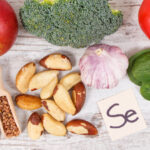Selenium levels linked to lower risk of premature death, decade long study reveals
 (NaturalHealth365) Could something as small as trace minerals really offer that many health benefits? Research strongly indicates yes. For example, selenium levels in your body heavily influence immune strength and overall well-being.
(NaturalHealth365) Could something as small as trace minerals really offer that many health benefits? Research strongly indicates yes. For example, selenium levels in your body heavily influence immune strength and overall well-being.
A 2018 study highlights just how powerful this tiny mineral can be, whether consumed through diet or supplements. Further supporting this, a newer study found that selenium plays a significant role in reducing inflammation related to obesity. Despite a higher dietary intake, obese women showed lower selenium levels in blood and higher levels in urine, suggesting issues with selenium retention or utilization.
Study results: Higher levels of selenium linked to a longer life and lower levels of inflammation
The study published in the Journal of Nutrition Health & Aging was a prospective cohort study involving nearly 350 men and women aged 80 and older living in a small community in Italy. These subjects gave blood samples at the beginning of the study, which was called the Aging and Longevity in the Sirente geographic area (ilSIRENTE) study.
You’ll be amazed by what the researchers found after a 10-year follow-up:
- Low levels of selenium were associated with a significantly increased risk for all-cause mortality, even when controlling for confounding factors.
- Meanwhile, people with the highest levels of selenium had the lowest levels of key inflammatory markers, including C-reactive protein and interleukin-6 (IL-6).
This last point highlights exactly why selenium is so good for your health. As a small but mighty antioxidant, selenium helps to quell chronic inflammation, the key underlying issue of almost all chronic diseases.
Understandably, other research indicates that a selenium deficiency is associated with cancer, arthritis, depression, heart disease, and male infertility. And, because low levels of selenium tend to co-occur with iodine deficiency, pregnant women who don’t have enough selenium are more likely to give birth to infants with developmental problems.
Are you getting enough of this trace mineral? This is the recommended daily allowance for selenium, according to experts
As with most minerals, vitamins, and other nutrients, the recommended daily allowance (RDA) depends on individual factors. How old are you? What is your current state of health? Are you pregnant or nursing? As the National Institutes of Health (NIH) points out, these and other questions should be considered.
It is possible, however, to make some general recommendations based on available research. For example, most adults and kids aged 14 and up should aim for 55 micrograms (mcg) of selenium daily. Pregnant and lactating women should increase their intake to 60 mcg to 70 mcg per day, respectively.
Meanwhile, younger children need slightly less selenium for optimal health benefits. Again, from the NIH:
- Infants up to 6 months: 15 mcg
- 7 months to 3 years: 20 mcg
- 4 years to 8 years: 30 mcg
- 9 years to 13 years: 40 mcg
So, how do you get this essential, anti-inflammatory, antioxidant nutrient in your system? In addition to adding a high-quality selenium supplement, you can also source selenium from your diet. Top selenium-rich foods include:
- Grass-fed (organic) beef and poultry, including chicken (3 ounces of roasted chicken contains 22 mcg of selenium, or 31% of your recommended daily intake)
- Wild seafood, including halibut and sardines
- Organ meat or offal, including liver, heart, and tripe (3 ounces of pan-fried beef liver contains 28 mcg of selenium or 40% of your recommended daily intake)
- For vegetarians or vegans: Nuts, such as Brazil nuts and cashews (just 6 to 8 Brazil nuts contain a whopping 544 mcg of selenium!)
- Pasture-raised (organic) eggs – 1 hard-boiled egg has 15 mcg of selenium or 21% of your daily value
Simply put, avoid toxicity and maintain a good (healthy, organic) diet to enjoy great health. This will take some effort, but the rewards are priceless.
Sources for this article include:
NIH.gov
Lifeextension.com
Springer.com
NIH.gov
Livescience.com



